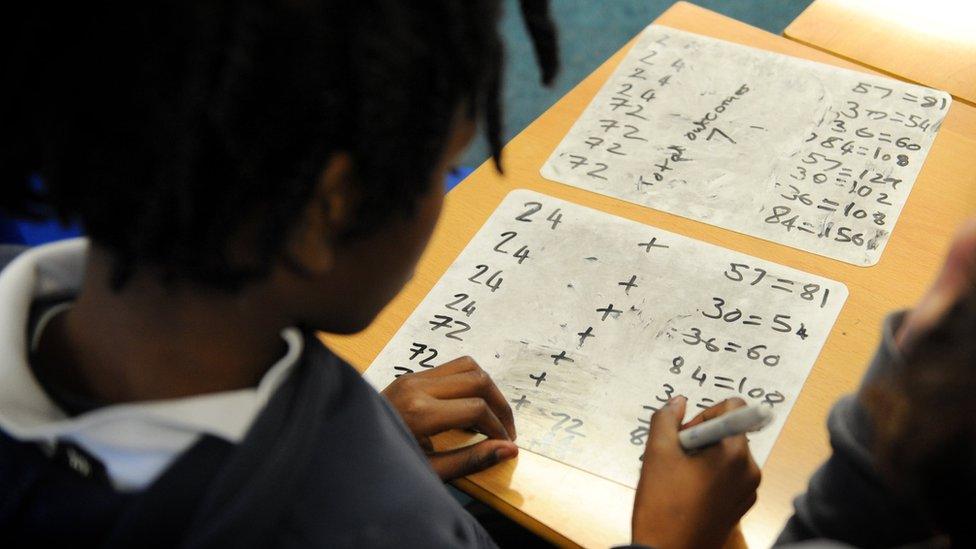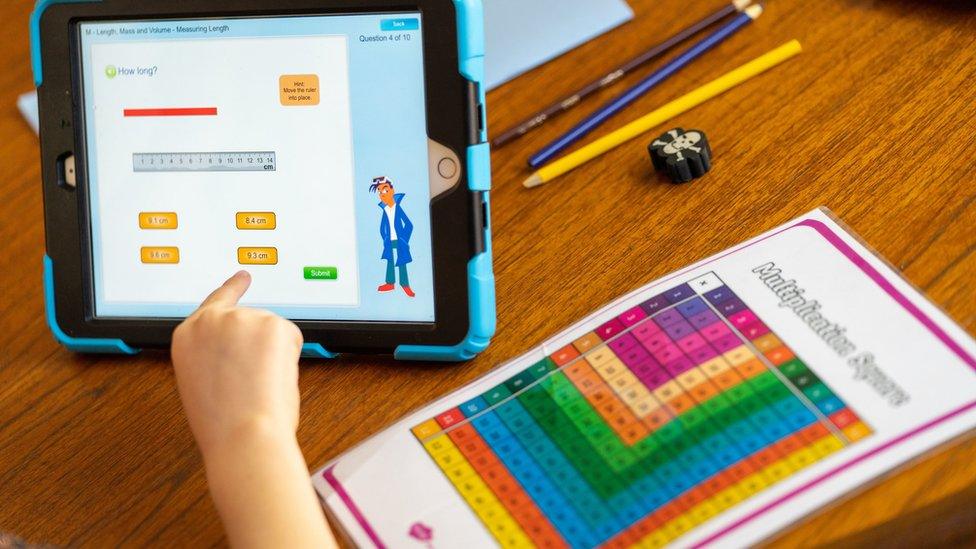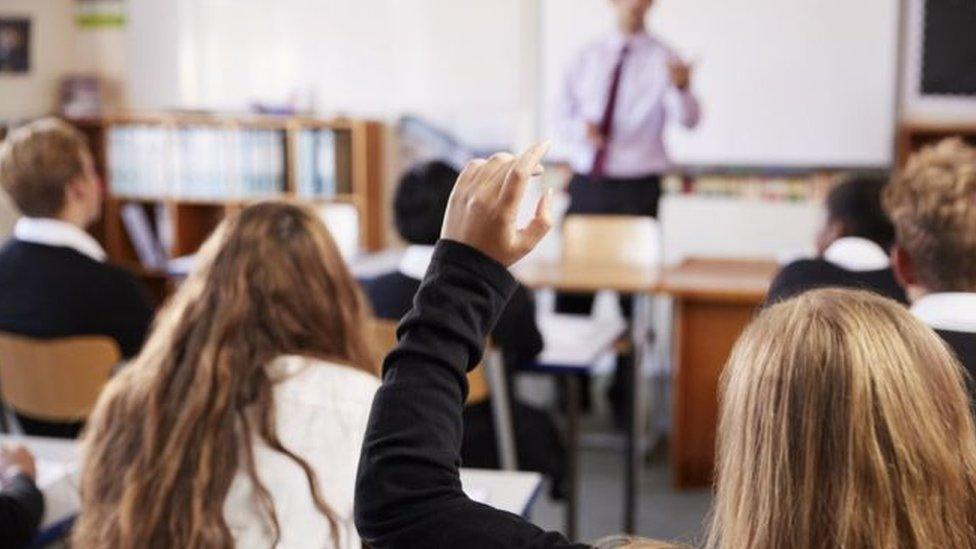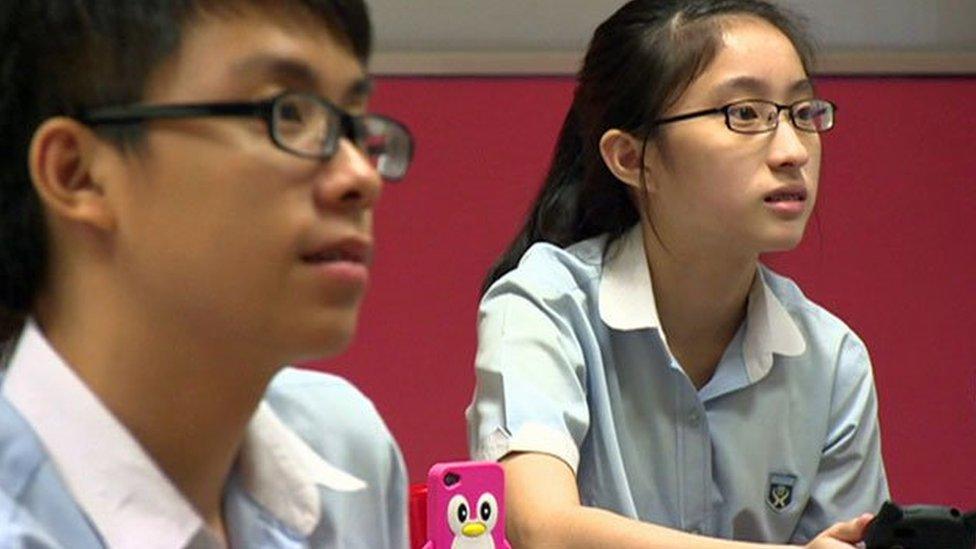Northern Ireland primary pupils 'high-achievers in maths'
- Published

NI's global maths ranking of seventh puts pupils ahead of their counterparts in England and the Republic of Ireland
Northern Ireland has some of the highest-achieving primary school pupils in the world in maths, according to major international tests.
NI pupils ranked seventh out of 64 countries and regions in the Trends in International Maths and Science Study (TIMSS).
They are only behind pupils in Singapore, South Korea, Hong Kong, Taiwan, Japan and Russia.
In primary science, however, NI ranked above average but in 26th position.
One of the reasons for local success in maths, the study found, was that almost two-thirds of parents in Northern Ireland interviewed by researchers said they did some maths and English work with their children before they started primary school.
The International Association for the Evaluation of Educational Achievement (IEA) TIMSS latest rankings are based on tests taken in 2019 by about 600,000 students aged nine and 10 in 64 countries.
Ahead of England and Ireland
In Northern Ireland, about 4,500 pupils in 150 primaries sat the tests.
The international IEA TIMSS research has been carried out every four years since 1995.
Northern Irish pupils were placed sixth in the world in maths in both 2011 and 2015.
Their global ranking of seventh in the 2019 study is a drop of one ranking place but puts them ahead of pupils in England (eighth) and Ireland (ninth).
It also puts Northern Irish pupils ahead of countries like Norway and Finland, which are usually high achievers.
The IEA TIMSS study is regarded as one of the most important global comparisons in primary education.
It is carried out by the IEA and academics from the TIMSS & PIRLS International Study Centre at Boston College in the US.

There were no significant differences in how girls and boys performed in maths and science
Dr Michael O. Martin, from Boston College, said the results of the study were used by many countries to gauge how well they taught children maths and science.
"We collect a lot of collateral information about the curriculum, about teaching methods, about student attitudes," he told BBC News NI.
Dr Martin said the study suggested primary school pupils in Northern Ireland were taught many more hours of maths than science.
"In terms of time spent on science instruction in Northern Ireland, you spend an average of 38 hours per year, which is well below the average of 73 hours per year elsewhere," he said.
"Contrast that with mathematics where they spend 203 hours per year, in comparison with an average internationally of 154, and you can see that Northern Ireland spends more time proportionally on maths than other countries and less time on science than other countries.
"That's a big difference."
Doing well but 'not liking Maths'
No primary schools in Northern Ireland who took part in the tests said they had a dedicated science laboratory.
However, Dr Martin said the education system in Northern Ireland compared well with other countries in many areas.
"Children in Northern Ireland all go to schools where there is a high emphasis on academic success and their parents are generally very satisfied with their schools," he said.
"Kids have a good sense of belonging in school, compared to other countries.
"Their teachers are generally well-educated - they all have degrees and about 15% have post-graduate degrees."

The tests and research for the study were carried out in 2019, before the Covid-19 pandemic and homeschooling
But he also said that in countries which performed well in maths, like Northern Ireland, that did not mean most pupils liked the subject.
"We noticed this in the high-performing countries - in Japan and Korea and Singapore - they do really well in maths but when you ask them do they like learning it they say 'no, not so much'.
"We think that's probably because mathematics learning is more difficult and more challenging.
"That may also be the case in Northern Ireland."
'A good story'
There were no significant differences in how girls and boys performed in maths and science.
However, pupils taught in schools categorised by the study as "most affluent" had significantly higher scores in maths and science than pupils taught in schools categorised as "most disadvantaged".
The National Foundation for Educational Research's (NFER) co-ordinator for Northern Ireland, David Thomas, said NI's position was a stable one.
"That's a good story in mathematics because that performance is right at the top of the European countries, and that position has been maintained since 2011," he said.
"In science, Northern Ireland's performance has also maintained its level, but that's more of a midfield position among European countries."
Although the study has just been published the tests and research informing it were carried out in 2019, before the Covid-19 pandemic.
Related topics
- Published7 December 2020

- Published29 November 2016
